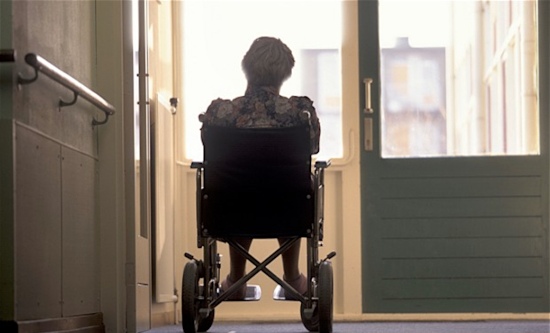
The revelation that Runwood Homes, the sixth largest for-profit care home provider, had paid its CEO Gordon Sanders £21m over a five year period, despite inspectors finding numerous breaches of staffing and safety regulations in its homes, epitomises the crisis in social care. Runwood, which specialises in dementia care, had a turnover of £154m in 2021. Yet one in three of its 60 homes have been found to breach health and safety standards, with insufficient staffing, awful food, and residents subjected to brutal restraints. This is a system which can make fortunes for a few out of overworked staff on poverty pay, where standards are appalling and regulation next to non-existent.
The tsunami of unmet need
On 1 November 2022, the head of the Association of Directors of Adult Social Services told a conference of senior social workers that things had never been so bad for people needing care, carers and staff. Sarah McClinton said the scale of unmet need in the social care sector was staggering, with carers at breaking point and services unprepared for the coming winter. Her words were echoed by the Care Quality Commission (CQC), which in its latest report on the provision of social services in Britain in the last year described ‘a tsunami of unmet needs’.
The most immediate and public effect of this crisis has been the impact on an already overwhelmed NHS, what the CQC describes as a ‘gridlocked’ health care system. NHS waiting lists stretched to record levels are putting already huge pressure on an underfunded sector. This has been compounded by the fact that around 20% of people ready to leave hospital but needing continuing care cannot be discharged because there is nowhere for them to go. The Guardian (13 November 2022) estimated that in parts of the country as many as one in three hospital beds are taken up by people who are medically fit to leave but have no care package in place. The knock-on effects of this has made headlines for months: emergency departments unable to admit patients, ambulances stuck in queues outside A&E for hours, and catastrophic effects on health outcomes .
Around 400,000 people in England rely on care homes; a further 800,000 receive some form of care in their homes. Since 2012, responsibility for providing for their needs has been largely handed to local councils, which in turn contract it out to an array of private companies. 80% of residential care beds, for example, are now provided by for-profit providers. The councils are running out of money to purchase these services. The Health Foundation estimated that real-term spending on adult social care fell by 12% between 2010 and 2021. Chancellor Jeremy Hunt, in his Autumn Statement, allocated an extra £2.8bn funding for social care in 2023/24, with £4.7bn the year after; yet a month earlier, he conceded the social care sector needed an immediate £7bn just to stand still. Two thirds of this money will have to be found by councils raising council tax by 5%.
Hunt has said the extra money will deliver 200,000 ‘care packages’ but such is the scale of the problem that it will do little more than scratch the surface of need. Age UK says that there are 2.6 million people aged over 50 who are in need of care yet not receiving any. As cash-strapped councils cut eligibility for free care, 150,000 people have died over the past five years while on the waiting list.
Poverty pay
One of the key issues in meeting this vast need is the chronic staff shortages. There are a record 165,000 staff vacancies in the social care sector, with 50,000 care workers having left in the last 12 months alone. Social care workers are amongst the lowest paid workers in the country, with average hourly wages of £9.50, and many on zero hours contracts. Small wonder that the Health Foundation found that even before the cost-of-living crisis, one in five residential care workers were living in poverty, compared with one in eight of all workers. Over half of health and social care workers state that they are more than likely to leave the sector within one to three years – often to jobs in supermarkets or the hospitality sector which pay better. Inside Housing has calculated that 80% of all jobs in Britain pay better than care work. This poverty pay is worsened by rising fuel costs – many social workers depend on their cars to reach an increasingly widely dispersed number of clients – as well as the broader cost of living crisis. In its bleak assessment, the CQC expects staff retention to deteriorate further, because of what it describes as ‘historical underinvestment and lack of sustained recognition and reward for the social care workforce.’ Those affected are predominantly women, black people and migrant workers.
In these circumstances, many smaller non-specialist care homes cannot make sufficient profits to make it worthwhile, however much they overwork their staff and however little they pay them. Many have gone bust; others have handed back their contracts to councils that do not have the resources to provide the care themselves. But specialist services and the larger care home groups are raking it in. The biggest care home chains saw profits rise by 18% during the pandemic. It was Runwood Homes which logged the biggest rise – 37%, from £15m in 2019 to £25.4m in 2020. Shadow care minister Liz Kendall said, ‘It’s totally outrageous for private providers to be leeching millions out of care homes while providing appalling standards for residents’. This is sheer hypocrisy: Labour helped set up this privatised system, and this is how capitalism works. Kendall, an ardent admirer of ‘public-private partnerships’, will not change anything if Labour forms the next government.
Alex Scurr
FIGHT RACISM! FIGHT IMPERIALISM! 292 February/March 2023




